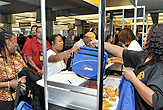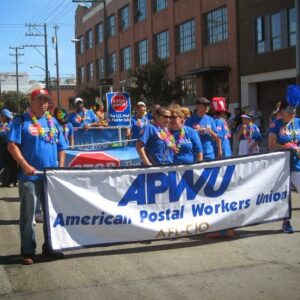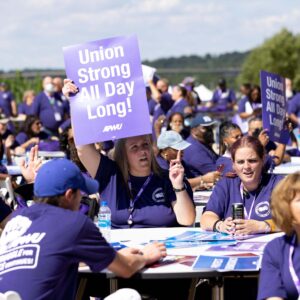August 24, 2010
‘Our Union is Alive and Strong’
APWU President William Burrus told delegates to the 20th Biennial National Convention that the union is “alive and strong.” Despite the nation’s frail economy, “We can point with pride to the fact that our members were shielded from the tragic effects of layoffs and downsizing,” he said.
“I draw no greater satisfaction than knowing that despite the storms that gathered, our members were covered by the umbrella of union representation,” he said.
“We continue to fulfill the primary responsibility of a labor union: Providing outstanding representation to postal employees,” the union president said in his final State of the Union address.
Responding to Challenges
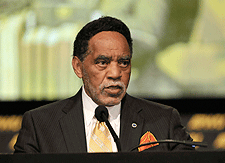 “The anemic hiring practices of the Postal Service,” coupled with the effects of automation, subcontracting, computerization, and worksharing have conspired to reduce our ranks, Burrus noted, but union commitment is strong.
“The anemic hiring practices of the Postal Service,” coupled with the effects of automation, subcontracting, computerization, and worksharing have conspired to reduce our ranks, Burrus noted, but union commitment is strong.
“We have weathered the storm and, among the remaining employees in the APWU bargaining unit, we have achieved a record high voluntary participation rate,” he said. More than 83 percent of eligible postal employees belong to the APWU.
To address the reduction in membership rolls, the union launched “aggressive budgetary controls, reducing the union expenditures in excess of the membership losses,” Burrus said. The union has experienced budgetary surpluses in each year of this administration, he said, reflecting the union’s determined efforts to remove from the budget costs that are unrelated to representation.
In an unprecedented step to strengthen the union for the future, the APWU invited members 35 years of age and younger to participate in the convention as guests.
“We hope that when you return home, you will remain committed to the fight for our future,” Burrus told them.
Despite the daunting challenges we face, the union has continued its aggressive representation of its members, the union president said. The APWU is “second to none in grieving and arbitrating contractual disagreements with our employer, and we win our share,” he noted.
Preparing for Negotiations
Burrus reminded delegates that the next round of contract negotiations is set to begin just days after the conclusion of the convention, and said the union’s goals are to restrict excessing, gain access to information from the Postal Service without cost, win more opportunities for upward mobility, limit subcontracting, and increase wages.
While 2010 bargaining will be difficult, Burrus assured delegates that the union expects to achieve more gains in these negotiations.
“We expect a contract that adequately rewards members for maintaining the best postal system in the world.”
The Fight for Change
Burrus commended delegates for their activism in confronting the challenges that threaten the viability of the Postal Service: Fighting to Save Saturday Service; protesting station and branch closures, and derailing facility consolidations.
The union president also encouraged members to get involved in the legislative process.
“As postal workers, we have much at stake in the upcoming elections and in several crucial bills,” Burrus said. “We must have a voice on Capitol Hill.”
Burrus concluded with advice to members about the responsibilities of union leaders.
“While we will not win every battle, we will do everything in our power to protect the interests of APWU members,” Burrus said. “Let us individually and collectively determine that every day we will sharpen our arguments, we will improve our means of persuasion, and when all else fails, we will appeal.
“Let us everyday continue the great traditions of the American Postal Workers Union.”
Delegates Declare:
Stop the Pain of Excessing
Delegates to the APWU National Convention got down to business on the meeting’s opening day, voting on more than 90 resolutions that were submitted to the union’s Labor-Management Committee. The resolutions are proposals for improvements to the Collective Bargaining Agreement, and will be considered by the APWU negotiating team when bargaining begins Sept. 1.
Many of the resolutions focused on reducing the hardships workers suffer when they are subjected to involuntary reassignments, known as “excessing.” Employees are frequently reassigned to work sites hundreds of miles away from home or to positions outside their craft.
Resolution #46, which was adopted by the delegates, suggested that the APWU negotiate with management to ensure that when multiple excessing events impact a craft at the same facility during the same period, management must combine them. Doing so would strengthen seniority, delegates said.
Dave Baskin of the Northwest Illinois Area Local spoke in favor of the resolution. When senior employees at the Palatine facility volunteered to be reassigned “in lieu of” junior employees during the first wave of excessing, they lost retreat rights, he explained. Other senior employees who waited ended up being reassigned furthest away. “So it was a double whammy — a no-win situation,” he said. “We thought this motion would clean this up and give them the opportunity for fairness.”
Delegates also voted to approve Resolution #49, which advises union negotiators to seek to increase to seven the number of successful bids employees may have during the life of the contract. “There are people in our local facility who have been excessed within the installation three times in the same year,” said A.J. Jones a member of the Eastern Montgomery County (PA) Area Local. “It’s taking people three or four bids to get back to something even close to what they had.”
The convention also approved measures that would expand employees’ options after excessing occurs.
Delegates voted in favor of a proposal, Resolution #51, which would allow senior employees in the same craft or occupational group in the same installation to elect to be reassigned to any craft within the installation in lieu of a junior employee.
Resolution #52 instructs union officers to negotiate with management to grant employees the right “to accept or decline retreat rights” to the craft from which they were reassigned.
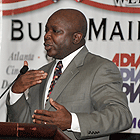
Pre-Convention BMC Conference
Many delegates arrived in Detroit a few days early to attend the Bulk Mail Centers (BMC) conference on Aug. 20. Members convened to discuss the transition of BMCs to National Distribution Centers (NDCs); consolidation of facilities, and the effect on jobs and mail volume.
“The conference represents all crafts and deals with multi-craft issues,” said Idowu Balogun, National Maintenance Division Representative-at-Large and BMC Coordinator.
“We learn from each other,” Balogun said. “We communicate not just at this meeting but on a regular basis.”
Young Activists Attend Convention
Be on the lookout for lavender badges on the convention floor: These credentials belong to union members age 35 and younger, who were invited to attend the convention by APWU President William Burrus as a way to encourage youthful members to get more involved in the union.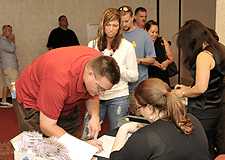
“I invited you here because we want you to see our union from the inside,” Burrus told the group of young activists at an introductory meeting on Sunday. “We want you to get involved with the union that controls your future.”
In March, Burrus announced that the national union would help defray the costs associated with sending members 35 years of age and younger to this year’s National Convention. Locals responded enthusiastically, and 100 participants signed up. Currently, there are fewer than 6,000 union members in the bargaining unit who fit in that category, Burrus told the young workers.
“Fifteen years from now, there will be leadership roles that need to be filled by your age group,” Burrus told the special participants. “I hope that many among you will fill these roles within the union.”
Burrus said that he brought the 35-and-under crowd to Detroit to see how the union operates at the National Convention, especially as the APWU prepares for contract negotiations, which start Sept. 1.
Because most of the participants have not been officially elected as delegates, they cannot be granted voice or vote by the convention. However, a motion was approved by the delegation at Monday’s general session to allow the special participants access to the convention floor.
Burrus encouraged the participants to get involved in the discussions among their local delegations. He outlined some convention highlights, and told the group that “there will be laughter, very serious business, and agreements and disagreements.”
Delegates are encouraged to welcome the young attendees, who will be seated with their locals for the remainder of the convention proceedings. Following the initial meeting on Sunday, the participants were energized and eager to learn how their union works at a national convention.
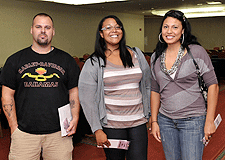 “This is a wonderful opportunity,” said Mica Dunn, a member of the Baton Rouge, LA Area Local, who said she has been a member of the APWU since she started working for the Postal Service five years ago. “I’m looking forward to seeing how they do things, and learning about the union and our future.”
“This is a wonderful opportunity,” said Mica Dunn, a member of the Baton Rouge, LA Area Local, who said she has been a member of the APWU since she started working for the Postal Service five years ago. “I’m looking forward to seeing how they do things, and learning about the union and our future.”
Many participants were grateful for the chance to spend time with other participants in their age group.
“When I became involved in my local, I was the youngest,” said Sharon Henderson of the Montgomery, AL Area Local. “I need this training so I can be prepared to take the place of the other activists when they retire.”
Eric Farmer, a member of the Madison, Wisconsin Area Local, said the opportunity to come to the national convention propelled him to become more active in his local union.
“I just became a union steward, and I want to get more involved,” Farmer said. “I’m excited to be here.”
Burrus told the participants that his goal for the young activists was to get them more involved with their local unions and learn about how the union works.
“If I come back in 30 years and if even one of you is standing where I am, I will consider this experiment a success,” Burrus said. “In the days ahead ,and as you proceed with your career, you will have the opportunity to speak for yourselves, and millions do not have that right.”
Change!
Stage Set for a Busy Convention Week
Aug. 23 marked the first day of the national convention — and set the stage for a busy week in downtown Detroit.
Tuesday, Aug. 24. The general session will break at noon for a rally to Save Saturday Service. Delegates will march from the COBO Convention Center to Campus Martius Park.
Tuesday, Aug. 24. Tuesday evening will feature a tribute dinner honoring APWU President William Burrus, who is retiring at the end of his term in mid-November. Delegates must have tickets to attend the event., which will be held at the MotorCity Hotel & Casino.
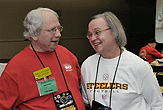 Thursday, Aug. 26, will feature the Parade of States. COPA night, which will honor top local and individual contributors, will follow. Attendees will have the chance to show off dance moves at the “Motown” themed event.
Thursday, Aug. 26, will feature the Parade of States. COPA night, which will honor top local and individual contributors, will follow. Attendees will have the chance to show off dance moves at the “Motown” themed event.
Saturday, Aug. 28. The Deaf/Hard of Hearing Task Force Conference will convene at 9 a.m. Saturday morning. Following the general meeting, the group will participate in breakout sessions.
There will also be a series of post-convention workshops sponsored by the Research and Education Department.
COPA fundraising will be a recurring theme at the convention, with three raffle drawings being held during the week: One on Wednesday, one on Thursday, and one on Friday. Raffle tickets are being sold for $20 apiece at the COPA booth. Delegates may also purchase lapel pins commemorating the 40th anniversary of the Great Postal Strike of 1970 to benefit COPA at the APWU Store in the convention Exhibit Hall for $15 apiece.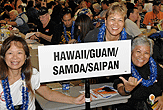
Video Highlights
Videos of convention highlights are being broadcast each day in hotel rooms:
Courtyard by Marriott – Ch. 18
Greektown Hotel – Ch. 2
Hilton Garden – Ch. 38
MotorCity Hotel – Ch. 4
Marriott Ren. Ctr. – Ch. 76
The Westin Book – Ch. 76.
Credentials Committee
As presented by Chairperson Geneva Greenlee of the Indiana APWU, the preliminary report of the APWU Credentials Committtee for Monday, Aug. 23, is as follows:
The 20th Biennial Convention’s 2,016 delegates represent 294 locals, 50 states, Guam, Puerto Rico, and the Virgin Islands. Also in attendance are 84 national officers and five Retirees Department delegates.
2010 APWU
Convention Highlight Videos
![]() Video 1 (Part Two)
Video 1 (Part Two)![]() Video 2
Video 2 ![]() Video 3 (Part Two)
Video 3 (Part Two)![]() Video 4 (Part Two)
Video 4 (Part Two)![]() Video 5 (Part Two)
Video 5 (Part Two)

